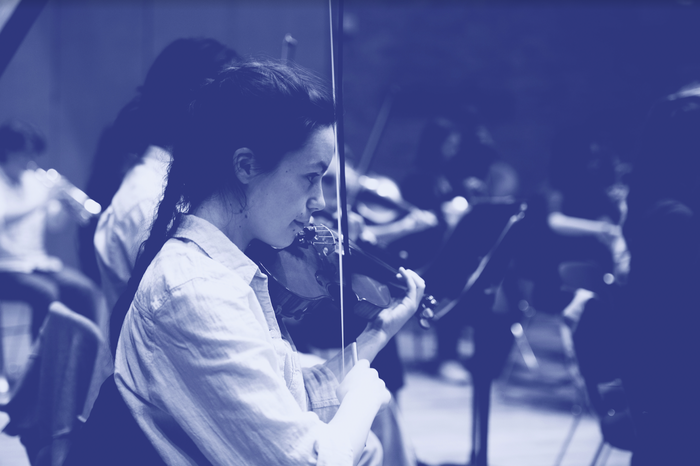Is the Cambridge music scene unique?
The Varsity music team investigate the peculiar intricacies of the Cambridge music scene

Sped-up remixes, AI rap and chronic complaints about the evils of Ticketmaster have made it clear that 2023 is shaping up to be another bizarre year for the music industry. But how does Cambridge fit into all this? Are the trends that we are seeing nationally and internationally being replicated on a local scale? In a city better known for its medieval chapels than its live venues, we decided to take a closer look at how unique Cambridge’s eclectic variety of student ensembles, bands and artists really is.
“Producing music in your bedroom is easier than ever, and much cheaper than renting a rehearsal space”
Student bands are one of the most pervasive features of the Cambridge music scene, one of these is the much-loved Just Me and the Geese. Composed of music students Maggie, George, Liv and Archie, the group have achieved an impressive 15,000 streams of their single ‘Slipped Away’ and are planning to pursue music full-time after graduation. We asked Liv why she thinks bands seem to dominate the local scene. She explained that it is much easier to get booked for events as a band because “people want something they can dance to.” She also emphasised the impact of the Centre for Music Performance’s Band Hub and the desire to perform collaboratively after the isolation of Covid-19.
“Writing with other musicians improves what you produce and really stretches you,” Liv explained: “it’s also a great bonding experience.” Composing as a group allows Liv to play to her strengths and compensate for her weaknesses. “Archie will do the chords and harmony and I’ll do the melody and lyrics,” she clarifies.
Nevertheless, as Liv admits: “in pop, people still like a celebrity persona.” Despite the immense popularity of groups like the 1975 and boygenius, solo artists continue to dominate the charts. Partly, this is due to financial considerations – producing music in your bedroom is easier than ever, and much cheaper than renting a rehearsal space. However, a lot of it has to do with social media. It’s much less complicated to convey your identity as a solo artist than as a band.
The rise of the female singer-songwriter epitomises this trend. Artists like Mimi Webb have shot to the top of the charts by promoting themselves through TikTok. However, the Cambridge scene is less hospitable towards those seeking to make it by themselves. The winner of Jesus College’s Hook, Line and Lyric competition, Iona, emphasised the lack of solo performers in Cambridge, declaring: “people think that I’m a massive narcissist, naming my band after myself, but I’m like, ‘No, I’m a solo artist’”.
“Jazz remains fundamental to social life at Cambridge”
Another specificity of the local scene is the uncustomary popularity of jazz and classical music. We spoke to Alex Wrathall, Selwyn choral scholar and music student, about the tensions between experimentation and tradition within the music faculty. He claimed that professors “rarely engage with popular music”. Choral evensongs are frequently perceived as the epitome of musical entertainment, resulting from centuries of tradition.
Although students often merge old and new – a recent show at Downing’s Heong Gallery integrated contemporary classical composition with electronic music whilst encouraging the audience to draw during the performance – a “division” between institutional music and innovation persists. Rather than encouraging the creativity of Cambridge students, there is a tendency among Cambridge choral directors to “inhibit experimentation or progress”. Alex contemplates the possibility of a more open-minded music scene in which the merits of classical training are recognised, but students have the “freedom to figure things out”.
As for jazz, our writer, Dylan Sudworth, argues that it remains fundamental to social life at Cambridge: “If you’ve gone through an entire degree without hearing a jazzed-up version of ‘Valerie’ (I’m looking at you, Hot Content), you’ve done something wrong.” For Dylan, Clare Jazz epitomises the strengths of the Cambridge scene: “Cheap, intimate, and consistently excellent, the cellars transform into a smoky bar from 1950s New York, complete with neon-red lighting, questionable cocktails, and multiple saxophones.” Asked to recall a highlight, Dylan chose a performance from the award-winning Xhosa Cole: “Cole went toe-to-toe with Clare’s Judah Daniels in a scene reminiscent of an Eminem rap battle. If Clare Jazz is anything to go by, the genre’s position at the heart of the Cambridge music scene is completely justified.”
Our conversations with Cambridge musicians revealed an awareness of the large-scale changes in the music industry, but nevertheless struck us with their fresh perspectives, which often deviated from what is expected of them. While the influence of social media trends, record label demands and changing audience tastes is inescapable, it’s clear that Cambridge students are not just reflecting the musical world they live in. Bewitching medieval liturgies, intimate jazz nights and the power of the student band mean that the city provides a truly distinct musical experience.
 News / Under 3% of applicants for Cambridge academic jobs are successful7 April 2025
News / Under 3% of applicants for Cambridge academic jobs are successful7 April 2025 Film & TV / Adolescence: understanding the manosphere5 April 2025
Film & TV / Adolescence: understanding the manosphere5 April 2025 Lifestyle / Which college brunch should be next on your list?6 April 2025
Lifestyle / Which college brunch should be next on your list?6 April 2025 News / News in Brief: cats, Camelot, and construction woes6 April 2025
News / News in Brief: cats, Camelot, and construction woes6 April 2025 Arts / Imposter syndrome, solitude, and not reading: John Berryman’s Cambridge4 April 2025
Arts / Imposter syndrome, solitude, and not reading: John Berryman’s Cambridge4 April 2025





